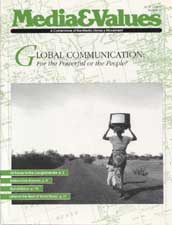Listening to the Beat of World Music
|
This article originally appeared in Issue# 61
|
Music puts a face on a country in a way no news report ever can. Paul Simon's Graceland album, recorded in the mid-1980s with the South African a capella group Ladysmith Black Mombazo, brought life in South Africa close to many North Americans for the first time. Music offers a life-affirming, human-scale introduction to others and ignites a desire to understand more about the people and culture who make it.
Graceland was early evidence of a new development in the music industry: World music. Go into any major record store today and you'll find that world music has become big business. Tahitian choirs, gypsy bands, African soukous, Jamaican reggae, and other international musical styles fill the racks. The recording industry trade magazine, Billboard, now publishes a weekly chart of "world music" albums.
Meanwhile, more and more Western artists are being exported. Madonna and Michael Jackson are as popular abroad as they are in the U.S., and MTV distributes a mix of local and international music videos worldwide through a network that includes MTV Europe, Brazil, Latin America, Japan and Asia. Musicians around the world are exchanging ideas and using this cross-fertilization to develop hybrid musical styles.
Despite all the promise in these developments, there's a chance that this globalization will turn out as one-sided as the Northern hemisphere dominance in exploitation of the world's resources. Led by six global-scale recording companies-Polygram, Thorne EMI, MCA, Sony, Time-Warner, and BMG, the "internationalization" of music could mean that other countries simply become markets for Western pop rather than players in a global music enterprise. As hybridization takes place, indigenous music may eventually become just another exotic rhythm in a homogenous world music driven by the record companies' promotion machines. Western musical acts have already become the standard by which performances around the globe are measured, and English has become world music's lingua franca.
Hopefully, the diversity of world music will not only survive but be enhanced by this globalization process, offering listeners around the world an even greater chance to use music as a point of entry to other cultures.
How to Make Musical Comparisons
Go through your collection of recordings or go to your local library or record store and choose a popular recording by an international artist. (If you don't follow pop music, choose a recording from Billboard's World Music Chart or ask for a recommendation from a salesperson at your local music store.)
Before you listen to the recording, look at the package.
- Who released the recording? Is it one of the small independent labels like Triloka or Shanachie? Or is it one of the six multinational recording companies? (The multinationals have many "labels." Time-Warner, for instance, owns not only Warner Bros., but also Elektra/Asylum/Nonesuch, Island, Sire, Reprise, and other labels. Look carefully. The packaging will note both the "label" and the "record company.")
- How well does the company present the music? Are lyrics enclosed? Are they translated? Is other information about the music or musicians included? Do they put the artist and music in a cultural context?
If you worked at the record company, would you have included additional information to help listeners understand the musical style or culture?
- Look at the cover design. What image or design is being used to represent/sell the music? Does it offer any useful infornation about the music or the culture that the music comes from?
- Consider what else you know about the artist through interviews, advertisements, music videos, etc. Do you know anything about how the artist or group has been sold?
- Now listen to the recording. In what ways does the music sound like what you expected? How is it different? What aspects of the music surprise you?
- What language are the lyrics sung in? Is it the first language of the music?
- How does the music reflect or comment on life in its culture of origin?
Now that you've been introduced to this culture, be on the lookout for news of the country that it comes from. You may need to look beyond the nightly news or the local newspaper to find information. Try your library or local newsstand for publications that cover international news, and be sure to share your new interest with friends and family.



